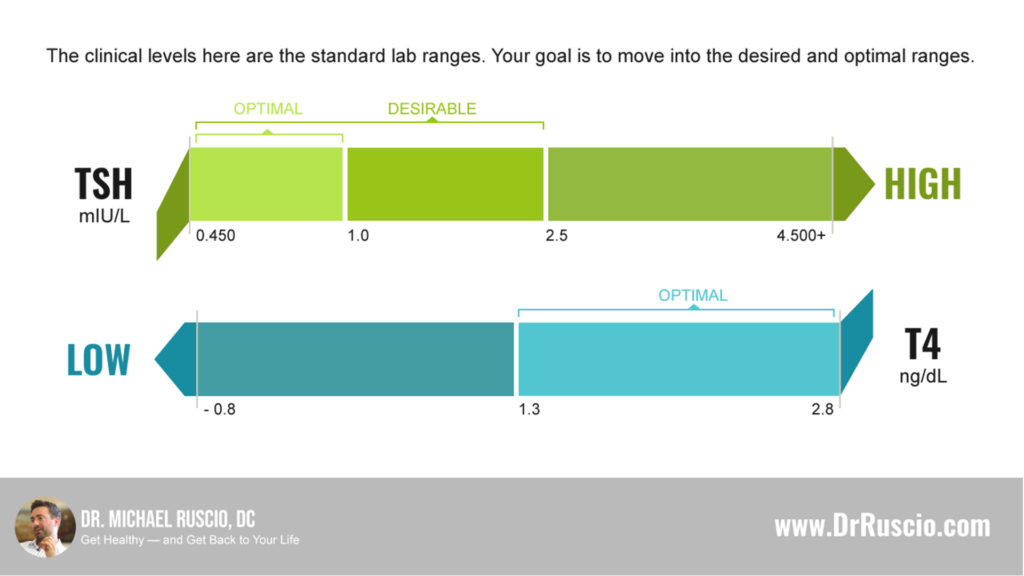How to Get Off of Thyroid Medication
When you’re sick and want to feel better, options like taking medication seem rather attractive. One thing to be aware of is the over-prescribing of thyroid medication. Many people do not need to be on thyroid medication for life or even at all. Unfortunately, overdiagnosis is becoming all too common. One study looking at the overuse of Levothyroxine Replacement Therapy found that 60% of those on LT4 did not need to be. The study concluded that the diagnosis needs to be more firmly established before treatment is initiated and periodic evaluation of all patients on chronic LT4 treatment should be performed to determine if treatment continuation is necessary.
Study: Levothyroxine Replacement Therapy and Overuse: A Timely Diagnostic Approach
https://www.ncbi.nlm.nih.gov/pubmed/30351232
Study Methods
- 291 subjects (84% females), average age 48, on levothyroxine replacement therapy without a solid diagnosis of hypothyroidism being provided, the treatment was paused.
- At the beginning and after 6-8 weeks of treatment discontinuation TSH, FT4 levels were assessed and thyroid ultrasound (US) was performed.
- A value of TSH ≥4.5 IU/mL was considered as underlying hypothyroidism.
Here’s what happened among the 291 individuals:
- 39% became hypothyroid
- 60% subjects remained normal off of LT4
- The groups were comparable regarding:
- BMI, duration of treatment, thyroid volume and presence of thyroid autoantibodies
- Ultrasound findings were abnormal in the group who become hypothyroid
- Thyroid antibody status did not seem to dictate whether you would become hypothyroid or normal thyroid
Study Conclusion
- These findings suggest considerable overuse of thyroxine therapy. Our results highlight the need, before treatment initiation, to firmly establish the diagnosis to undertake periodic evaluation of all patients on chronic LT4 treatment to determine if treatment continuation is necessary.
- In all patients on long-term LT4 therapy where the diagnosis has not been definitively established, it appears rational to introduce a 6-8 week period of LT4 replacement therapy discontinuation, preceded and followed by TSH tests, as the first-line approach, a procedure which could be implemented as part of a common strategy among the scientific community to decrease current LT4 overuse.
Download this Episode (right click link and ‘Save As’)
Dr. Michael Ruscio, DC: Hey, everyone. This is Dr. Ruscio. Let’s talk about whether you need to be on thyroid hormone treatment. Now, we’ve done a couple of posts about this in the past, alluding to the fact that, in my opinion, hypothyroidism and the corresponding utilization of thyroid medications like Levothyroxine seem to be overused. This is especially an issue with well-intentioned but more progressive, integrative, and functional medicine providers. I think it’s a problem that needs attention called to it, and we all need to work a bit more concertedly to stop the overuse of thyroid medication. Now, I’d like to share with you a study that really found this. Here is what I think is the bottom line for people. If you’re not feeling well, you want to feel well. Thyroid hormone or potentially being hypothyroid brings with it a promise; get on medication and you will feel healthy again. That’s all fine and good, but what we don’t want to do, the thing that we’re trying to counterbalance against, is having people on thyroid hormone who don’t need to be on thyroid hormone.
Dr. Michael Ruscio, DC: We don’t want to be giving lifelong thyroid hormone replacement therapy to people that don’t need it because these people, most often, will not respond to the hormone, yet they continue to take a medication they do not need and I do see this. I see cases of patients who’ve been on thyroid hormone for five years and when I check the diagnosis, it seemed to be made very ambiguously and these patients are often able to come off thyroid hormone. Let me clarify, when we check the lab work to justifying the initial diagnosis they were not actually hypothyroid. Now I’ve been calling attention to this, but I want to share with you a study, and I’ll put the abstract up on the screen, that actually documented the same exact thing that we’ve been discussing. A study entitled Levothyroxine Replacement Therapy and Overuse: A Timely Diagnostic Approach, meaning it seems that being hypothyroid is kind of en vogue right now that may be leading to overdiagnosis and treatment.
Now let’s look what they did. They took 291 subjects with an average age of 48 years who are on Levothyroxine replacement therapy, who they felt did not have a solid diagnosis of hypothyroidism and then paused their treatments. They had them come off Levothyroxine. They tested at the start of this assessment, so right when someone went off thyroid medication they kind of did the baseline and then six to eight weeks later they tested again so they could see if their thyroid hormone levels tanked. Basically were they hypothyroid or did they actually maintain a normal level, meaning they actually weren’t hypothyroid? Let’s look at what happened. I should also mention they looked at a TSH value of over 4.5 as meaning someone was hypothyroid, which I think is absolutely justifiable.

Now among this 291 individuals, 39% became hyperthyroid. Okay, great. We would identify that, and now they go on medication, and they can do that in a confident manner. While 60% remained normal thyroid, normal, off of thyroid hormone medication. That is a big number. That is the majority. The groups were comparable in terms of their weight, so it wasn’t to say people who are heavier had more hypothyroidism. There was a similarity between that and also the duration of treatment, meaning people who had been on thyroid hormone for various lengths of time, that didn’t seem to dictate whether they became hypothyroid. This is a common concern. I’ve been on this medication for five years. Will I be able to come off? From what this study has found it appears that your length of time on thyroid hormone prior does not dictate your future prognosis as to whether you will become hypothyroid or maintain a normal thyroid state. That’s encouraging news.
The thyroid volume is also similar and the presence of autoantibodies, the presence of antibodies against the thyroid. The presence of Hashimoto’s was similar between groups, so this also did not seem to be a major piece dictating whether someone was or was not hypothyroid, which also dovetails in with some of my criticisms of overutilization or over-extrapolation from thyroid antibody assessments, and I’ll see if I can find the links for some of these previous posts if you want to go deeper into how to know if your thyroid antibody levels are abnormal or normal. Again, in this case, your thyroid antibody status did not seem to dictate whether you will become hypothyroid or normal thyroid. That’s good.
Sponsored Resources
We’ve discussed previously that your mouth is the first section of your gut. So in order to have a healthy gut, you have to have a healthy mouth. That’s why I like Quip’s electric toothbrush which is ADA approved. That’s the American Dental Association.
Quip provides an effective, two-minute clean with vibrations and guiding pulses that alert you when to switch sides. The time-guiding pulses combined with the soft bristles help prevent over-brushing which is a serious concern that can lead to receding gums.
What I like about Quip also is this electric toothbrush starts at $25, which is much cheaper than most electric toothbrushes. If you go to GetQuip.com/RuscioPodcast, right now you’ll receive your first refill pack free when you purchase the Quip electric toothbrush. That’s you’re first refill pack free at GetQuip.com/RuscioPodcast.
Now there was one thing that was different between these groups. The group that had a poor ultrasound finding, or I should say it this way, poor ultrasound findings were more common in the group who became hypothyroid.
If you wanted to add an assessment to running this experiment with your doctor you could ask for a thyroid ultrasound, and if it is abnormal, meaning a decreased amount of echo, that usually means that the gland has become somewhat scarred. That’s something that you may want to use with your doctor, although you probably don’t need to, to be honest, you can just run the experiment and if you see at the end of six to eight weeks off of your thyroid hormone your TSH levels go above 4.5, then you’ve affirmed that you likely have a thyroid issue and should go back on medication. Their conclusion, and I think it’s an important one.
Essentially we need to be more careful when making the diagnosis and before we put people on lifelong Levothyroxine therapy. Continuing,
Again, the good somewhat simple news here is that you can, if you want to test this, and again, do this with your doctor’s supervision, of course, perform a baseline test, perform another TSH test, and I would pair that with T4 also, but perform another test six to eight weeks later. If you see your TSH go above 4.5 then this firms up the diagnosis of hypothyroid. If you don’t see your TSH go above 4.5 then the likelihood of hypothyroid is very small.

Now, what if you have symptoms and you just want to feel better? Because I understand the ploy of, “oh, I’ll do anything to feel better.” Well, it doesn’t mean that taking thyroid hormone when you don’t need it is going to solve your problems. I would suggest a number of things, and I know this may sound kind of moot, but make sure you’re eating the right diet for you, especially a diet that’s healthy for your gut. Gut inflammation in my experience is one of the most commonly overlooked causes of symptoms that look like a thyroid problem, and this is why we’ve documented a number of case studies in our weekly newsletter of people who were able to decrease or come off thyroid medication once they improved the health of their gut. One thing, not the only thing, but one thing that may lead to this overutilization of thyroid hormone could be missing the fact that there’s a problem in the gut.
That problem in the gut is what’s causing the symptoms, and if you can address that your symptoms go away, and then thankfully you don’t need to be on thyroid hormone for the rest of your life. Remember, there is a time and a place for thyroid hormone utilization. But as I’ve been saying, and now as research literature is definitively helping to substantiate, overuse of both thyroid hormone and the overdiagnosis of hypothyroid is becoming a documentable and serious problem. In this case, 60% of patients who did not have a firm diagnosis of hypothyroidism were actually able to come off medication and be totally fine and maintain normal thyroid status. This is definitely something worth double checking if you’re on thyroid medication. This is Dr. Ruscio and I hope this information helps you get healthy and get back to your life. Thanks.
Dr. Michael Ruscio is a DC, natural health provider, researcher, and clinician. He serves as an Adjunct Professor at the University of Bridgeport and has published numerous papers in scientific journals as well as the book Healthy Gut, Healthy You. He also founded the Ruscio Institute of Functional Health, where he helps patients with a wide range of GI conditions and serves as the Head of Research.



Discussion
I care about answering your questions and sharing my knowledge with you. Leave a comment or connect with me on social media asking any health question you may have and I just might incorporate it into our next listener questions podcast episode just for you!